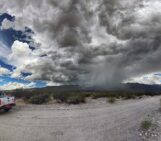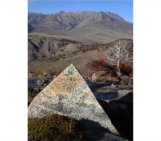
Photo by by Thomas Wöhling
In late October, autumn paints specks of colour in a Bavarian forest. Source: Imaggeo
Yet another global guide to saving democracy, this time titled The Anti-Autocracy Handbook: A Scholars’ Guide to Navigating Democratic Backsliding, authored by an all-star cast of academics based in the U.S., Europe, and Australia. Because, clearly, when it comes to understanding the creeping rise of authoritarian regimes, who better to consult than experts who live and work in societies where democracy, while imperfect, remains firmly cushioned by centuries of institutional privilege and lavish research funding?
Upon reading Geolog’s post that reports on this handbook, I couldn’t help but notice the blind spots of such a publication. Firstly, there isn’t a single author from Latin America, Africa, or Asia, where universities have been systematically weakened. Governments in these regions have been silencing academics, restricting research, and suppressing intellectual discourse for many years. It can be challenging to fully grasp the complexities of democratic decline from a distance when one is in a secure academic position.
It reads almost like the political equivalent of a gourmet cookbook written by people who’ve never been near a kitchen fire but have strong opinions about how to survive famine. And, of course, the solutions are “global” in the same way that international forums often are: globally intended, locally irrelevant. From what I’ve read of the book so far, I’m concerned that it feels less like a survival guide and more like a well-meaning lecture from the ivory towers of the developed world.
Realities of academic life in Argentina
I can speak from my experience in Argentina, which likely reflects the trajectory of many scientists across Latin America. Nearing retirement, I look back on more than three decades in the profession, and if there’s one thing I’ve learned, it’s that “justice,” in any absolute sense, is a luxury. What we do have, however, are tight-knit circles of influence: academic “clubs” with deep political connections, where members conveniently support each other’s advancement in academic competitions and the distribution of research funding. In countries that emerged from dictatorship a few decades ago, robust and fair political and scientific institutions are still a work in progress. Rules are fluid, mechanisms for appeal are shaky, and transparency feels, sometimes, like a distant dream.
When I entered university as a student in 1980, the fear of the dictatorship (which lasted until 1983) was still palpable. To enter the building, you had to show a police officer your student ID and backpack contents; political symbols of any kind were strictly forbidden. In the preceding years, students, professors, and staff had faced threats, violence, torture, exile, and even death for their political views.
Systemic contradictions and economic hardships
My academic path reflects some systemic contradictions. Let me give you an example: Thirty years ago, when I applied for a faculty position in physics, I was told I’d be a better fit in atmospheric sciences; when I applied there, I was advised to try physics. My interdisciplinary approach as a physicist working in atmospheric science didn’t fit neatly into the closed scientific clubs (call them mafias or lodges if you will) whose members don’t kill people, of course, but do guard their territory and protect their own.
Then there’s the economic reality: scientists here often must pay for part of their own conference travel, computer repairs, and even journal publication fees. In today’s global academic environment, there is “no paradise without Q1 journals.” Navigating waiver requests can feel like running a bureaucratic obstacle course. Salaries, already far lower than those in wealthier nations, are eroded further by inflation, though admittedly things are better now than in the days of hyperinflation, when paychecks evaporated before you could cash them. Paying the early registration fees for an international conference or traveling abroad has at times been a logistical nightmare, especially during periods of strict government currency controls. The juggling act of managing expenses and credit cards before, during, and after a trip would put an accountant to shame. In addition, once you arrive, a Latin American passport earns far more scrutiny at border control than one from the “developed” world. Officers rarely care if the purpose of your visit is to see a colleague.
The “We tie it together with wire” mentality
There’s a popular saying here: “Lo atamos con alambre” (“We tie it together with wire”), meaning we improvise experiments with whatever materials we can scrape together rather than the equipment we’d actually need. Experimental researchers are hit especially hard, as current funding barely covers salaries, leaving projects to languish. When grants are awarded, their timelines are often a fiction: a “three-year project” drips out funding so slowly that it stretches into five or six years, an unspoken method of rationing resources in an economy where inflation devours everything. Another example of unstable policies in developing countries is the sudden government insistence that research funding should now come exclusively from private companies. But what venture, exactly, is going to invest in atmospheric science research areas that are essential to national or international public safety but with no obvious short-term profit margin?
Scientists must not only learn to deal with authoritarian, denialist, or populist governments, but also to confront our own egos—which can tempt us to endorse arbitrary or unethical government measures in exchange for benefits, rewards, or mere “shiny trinkets.” From what I’ve witnessed in my country in recent years, for some, it may be harder to resist the weaknesses of human nature than to exercise critical thinking—and then to either oppose or at least sidestep participation in actions that are more ideological than academic. Let me give some concrete examples.
Populism, complicity, and the corruption of data
The consequences were serious. Judicial decisions turned against the country in several cases because contracts and debt payments had been indexed to inflation—
a metric that was being underreported. The manipulation damaged credibility, distorted economic planning, harmed savers and pensioners, and imposed hidden costs across society. A scientist of integrity should never ignore the obvious falsification of data. What happened in Argentina during those years recalls the propaganda practices of Ceaucescu’s Romania, where the regime manipulated temperatures to hide energy shortages. In our case, a populist government—not without the complicit silence of its loyal scientists—tried to convince people that their real income power was rising, even though it was clear to everyone that this was absolutely false.
In 2013, my international scientific cooperation trip to Germany was abruptly canceled. No one gave me an explanation, but the reason was obvious: the government’s disastrous economic management had drained its foreign currency reserves, and it could no longer fund its share of my travel. Mine was just one case among many others I later heard about. Worse still, for the same reasons, we were quietly cut off from accessing online scientific journals abroad—no official notice of canceled subscriptions was ever given. We had to beg foreign colleagues to send us the articles we needed. Meanwhile, the unconditional scientists of the populist regime—where the absence of objective criticism is justified with slogans like “let’s keep quiet so we don’t play into the hands of the right”—remained silent on all these issues. Yet two years later, when the political winds shifted, those same voices didn’t hesitate to criticize every single measure that didn’t involve increasing spending on science. As for me, under the new administration, I was finally able to make my long-delayed cooperation trip and regain access to at least some publications.
Political loyalty, pandemic ethics, and systemic corruption
During the pandemic, the same populist regime favored an almost total lockdown largely because, faced with its own incompetence, such a blunt measure was far easier than building consensus through the informed input of scientists, economists, sociologists, and other qualified professionals. In fact,
the former economy minister admitted three years later that the prolonged quarantine persisted in part because it politically benefited the administration. During COVID-19 times, a cohort of scientists firmly aligned with the presidency lent their support to a series of very controversial health decisions. Among other things, they effectively endorsed the emergency approval of a poorly documented Russian vaccine and backed the off-label use of a Chinese vaccine in children—pushing a health authority (ANMAT)
toward a favorable decision. Some of these scientists even presented—or perhaps biased the interpretation of—epidemiological models that supposedly
justified the government’s near-total lockdown. All those actions represent a breach of the ethical duty to advise public health policy purely on scientific grounds, rather than political affinity. In these circumstances, ideological loyalty and the pursuit of favor or narcissistic validation among a select group of scientists often took precedence over the most objective academic judgment. After all, a populist regime does not need to work hard to secure a troupe of flattering, obsequious, and servile artists, athletes, or scientists who curry favor—and in return receive grants, awards, and official tributes.
After forty years of democracy in Argentina, much has improved, but some endemic problems remain: corruption, favoritism, lack of transparency, some political groups in power claiming to speak with divine authority as “the voice of the people,” and their inevitable influence on science through loyal academic “lapdogs” who make discretionary decisions about positions and funding. If one of the specific parties is ruling the country, then these individuals may sometimes rise to leadership positions in institutions or to second or third-level government posts. And you’d better be careful about expressing your own political opinions to these scientific servants of power, at the risk of being labeled and eventually relegated within the system as a neoliberal in the service of the right.
They are owners of revealed truth, which is clearly a concept contrary to academic freedom.
At least one female scientist was publicly mocked on television in 2019, when the eventual presidential winner, along with a circle of servile academics, ridiculed her for supporting another candidate. Keeping a low profile is sometimes a good survival strategy, but it greatly diminishes your chances of ever accessing top positions. And of course, all the time you spend fighting injustices is time stolen from actual research and the rest of your life. Scientists in the developed world, welcome to the economic and political realities the rest of the planet has known for decades!





